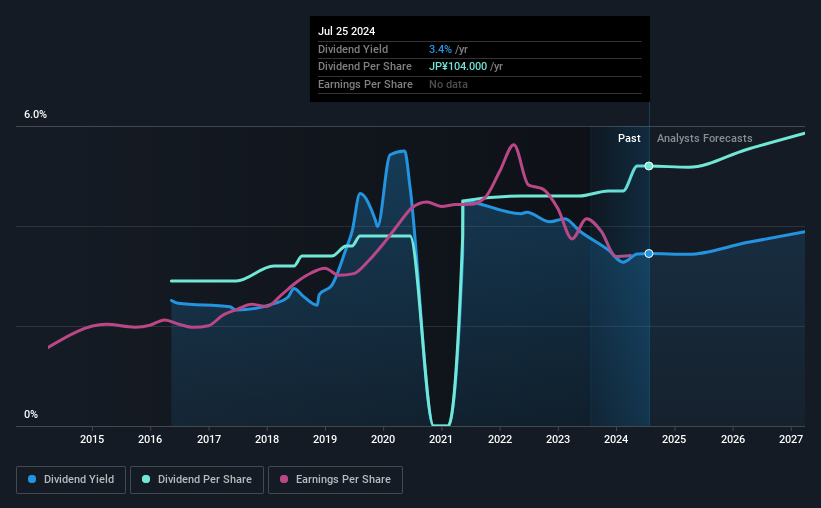Japan Post Insurance (TSE:7181) Is Paying Out A Larger Dividend Than Last Year

Japan Post Insurance Co., Ltd. (TSE:7181) will increase its dividend from last year's comparable payment on the 5th of December to ¥52.00. Based on this payment, the dividend yield for the company will be 3.4%, which is fairly typical for the industry.
See our latest analysis for Japan Post Insurance
Japan Post Insurance's Earnings Easily Cover The Distributions
Unless the payments are sustainable, the dividend yield doesn't mean too much. Based on the last payment, Japan Post Insurance's earnings were much higher than the dividend, but it wasn't converting those earnings into cash flow. Since a dividend means the company is paying out cash to investors, this could prove to be a problem in the future.
The next year is set to see EPS grow by 2.3%. Assuming the dividend continues along recent trends, we think the payout ratio could be 46% by next year, which is in a pretty sustainable range.

Japan Post Insurance's Dividend Has Lacked Consistency
It's comforting to see that Japan Post Insurance has been paying a dividend for a number of years now, however it has been cut at least once in that time. This suggests that the dividend might not be the most reliable. The dividend has gone from an annual total of ¥58.00 in 2016 to the most recent total annual payment of ¥104.00. This implies that the company grew its distributions at a yearly rate of about 7.6% over that duration. A reasonable rate of dividend growth is good to see, but we're wary that the dividend history is not as solid as we'd like, having been cut at least once.
Dividend Growth May Be Hard To Achieve
Given that the dividend has been cut in the past, we need to check if earnings are growing and if that might lead to stronger dividends in the future. Earnings have grown at around 2.5% a year for the past five years, which isn't massive but still better than seeing them shrink. The company has been growing at a pretty soft 2.5% per annum, and is paying out quite a lot of its earnings to shareholders. This could mean the dividend doesn't have the growth potential we look for going into the future.
In Summary
Overall, we always like to see the dividend being raised, but we don't think Japan Post Insurance will make a great income stock. While the low payout ratio is a redeeming feature, this is offset by the minimal cash to cover the payments. We would probably look elsewhere for an income investment.
Market movements attest to how highly valued a consistent dividend policy is compared to one which is more unpredictable. At the same time, there are other factors our readers should be conscious of before pouring capital into a stock. For example, we've identified 3 warning signs for Japan Post Insurance (2 can't be ignored!) that you should be aware of before investing. If you are a dividend investor, you might also want to look at our curated list of high yield dividend stocks.
If you're looking to trade Japan Post Insurance, open an account with the lowest-cost platform trusted by professionals, Interactive Brokers.
With clients in over 200 countries and territories, and access to 160 markets, IBKR lets you trade stocks, options, futures, forex, bonds and funds from a single integrated account.
Enjoy no hidden fees, no account minimums, and FX conversion rates as low as 0.03%, far better than what most brokers offer.
Sponsored ContentNew: Manage All Your Stock Portfolios in One Place
We've created the ultimate portfolio companion for stock investors, and it's free.
• Connect an unlimited number of Portfolios and see your total in one currency
• Be alerted to new Warning Signs or Risks via email or mobile
• Track the Fair Value of your stocks
Have feedback on this article? Concerned about the content? Get in touch with us directly. Alternatively, email editorial-team (at) simplywallst.com.
This article by Simply Wall St is general in nature. We provide commentary based on historical data and analyst forecasts only using an unbiased methodology and our articles are not intended to be financial advice. It does not constitute a recommendation to buy or sell any stock, and does not take account of your objectives, or your financial situation. We aim to bring you long-term focused analysis driven by fundamental data. Note that our analysis may not factor in the latest price-sensitive company announcements or qualitative material. Simply Wall St has no position in any stocks mentioned.
Have feedback on this article? Concerned about the content? Get in touch with us directly. Alternatively, email editorial-team@simplywallst.com
About TSE:7181
Japan Post Insurance
Provides life insurance products and services in Japan.
Very undervalued with acceptable track record.
Similar Companies
Market Insights
Community Narratives



